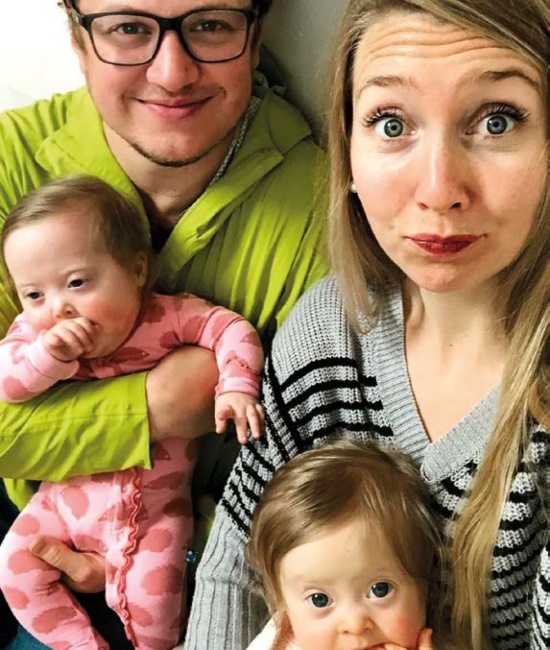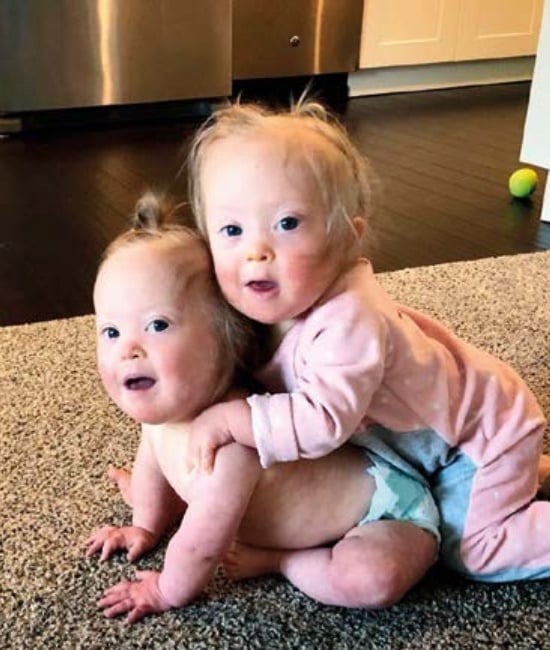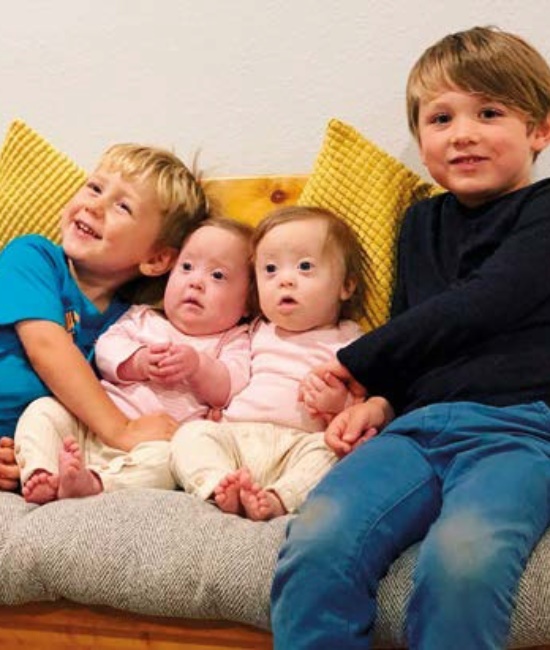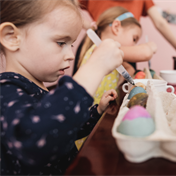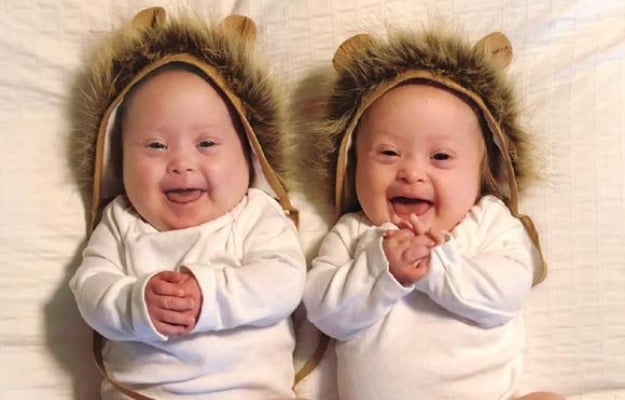
They’re bouncy, busy twin girls who love playing with their older brothers and fluffy dog, Baymax – and their proud mom and dad adore them to bits.
Many parents would be in a total spin if they were told there was a strong possibility their babies would be born with Down syndrome, but for Rachael and Cody Prescott it really didn’t matter.
Although doctors encouraged Rachael (29) to undergo tests to confirm if the unborn twins had the genetic condition, she refused. For her and Cody (32) it made no difference.
“We weren’t bothered with the possibility of Down syndrome,” she says.
“We knew we’d love our girls either way.” Even when Charlotte and Annette were born in February 2018 and were both diagnosed with trisomy 21, the most common type of Down syndrome (DS), the couple from Oregon in the USA weren’t fazed.
From the moment they clapped eyes on their twins they were hopelessly smitten. Now 18 months old, the girls are bundles of energy.
“Lottie [Charlotte] is observant, picking up quickly on communication, whereas Nettie [Annette] leads in physical development, cruising around our living room, and free standing,” says Rachael, who’s a stay-at-home mom.
And both children have a talent for stealing hearts around the world. In a bid to change people’s perceptions about DS, Rachael shares her family’s story with the more than 61 000 people who follow her Instagram account, @doublingdownmom.“We’ve loved every moment with our daughters, and they’re the lights in our lives,” she says.
“Down syndrome is nothing to fear and everything to celebrate. “The only difficult part in parenting children with DS is that the rest of the world has yet to understand the beauty and joy they radiate.” Rachael and Cody feel so strongly about spreading their message of acceptance they even have matching tattoos.
The skin art consists of three arrows to represent their daughters’ condition – most people are born with two copies of chromosome 21 but those with DS are born with three.
It baffles Rachael that pregnant women often elect to have an abortion rather than face a future raising a child with DS. “There are stigmas and this is why we share our story,” she says. “Society needs to turn from eradicating people with DS.
We need to make a shift to teaching DS children that they can have the same love and desire to live life to the fullest as any-one else.” In 2017 Cody was due to undergo a vasectomy but he and Rachael decided to put the procedure on hold.
They were keen to try for another baby, hoping they’d be able to give their sons, Easton (now 5) and Hudson (now 3), a sister. Fifteen weeks into the pregnancy they discovered there were twins on the way.
Doctors later warned there was a 50% risk their babies would be born with DS because one of the babies showed signs of a heart defect that’s linked to the genetic condition. But Rachael and Cody decided not to do invasive tests to find out if the twins had DS.
“We did however find out their gender,” Rachael says “We were just far too excited not to find out. And they were over the moon when they were told they’d soon be parents to two baby girls. After Lottie and Nettie were born at 35 weeks a nurse confirmed the babies had DS.
“My response was, ‘Really? Yay!’ ” Rachael says. “I actually hadn’t remembered my own response, but she later visited to tell me that I’d said this and that it was a relief to her to see our happiness because it wasn’t what she’d been expecting.”
The couple were far more concerned that both children had been diagnosed with heart problems and needed to be whisked away to the ICU.
Nettie had an atrial septal defect (ASD), a small hole in the wall between the two upper chambers of the heart. Thankfully this healed on its own after birth. But her sister’s heart condition was far more serious.
Lottie had atrioventricular septal defect (AVSD), which is often associated with DS and affects blood flow. This meant she’d need two heart operations to seal an opening between the two major blood vessels leading from the heart.
The twins were in hospital for 47 days before doctors gave them the green light to go home. But Lottie had to return when she was four months old to undergo the procedure to fix the leak in her heart. For the Prescotts it felt like déjà vu. They’d gone through a similar thing with Hudson when he was two and needed surgery to fix a heart-valve defect.
“Our experience with him was stressful. However it turned out to be very useful as it prepared us somewhat for Lottie’s surgery, which was a completely different monster,” Rachael says.
After having the surgery Lottie encountered many problems, including bacterial and viral illnesses, organ dam-age, a collapsed lung and pulmonary hypertension. For 35 days her parents kept vigil at her hospital bed, but Lottie is a little fighter and managed to pull through.
“We were elated to take our baby home,” Rachael says.Now just more than a year later the girls are just as active as other tots, crawling around, exploring and making messes. Having gone through everything that she has, Rachael has this advice for other parents who have children with DS.
“Cling to hope through any medical hurdles and to joy always,” she says.
“Celebrate your children. Never hesitate to proclaim their worth and show the rest of the world that DS isn’t a defect – it’s a blessing.”




 Publications
Publications
 Partners
Partners




